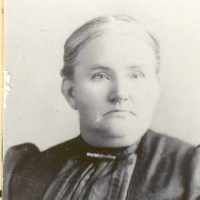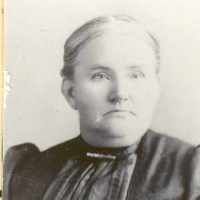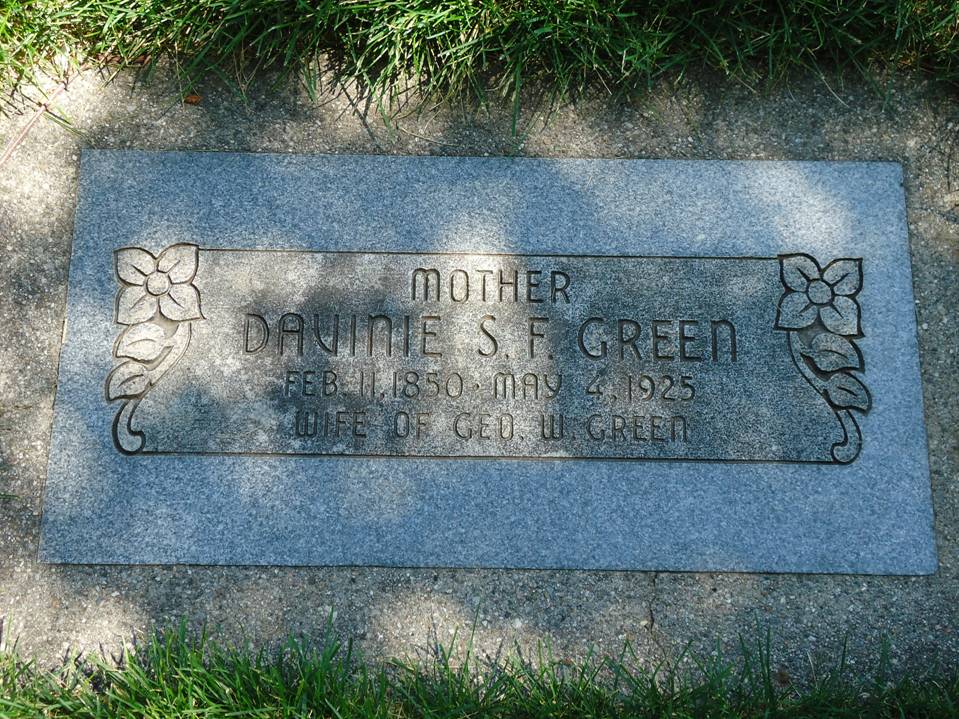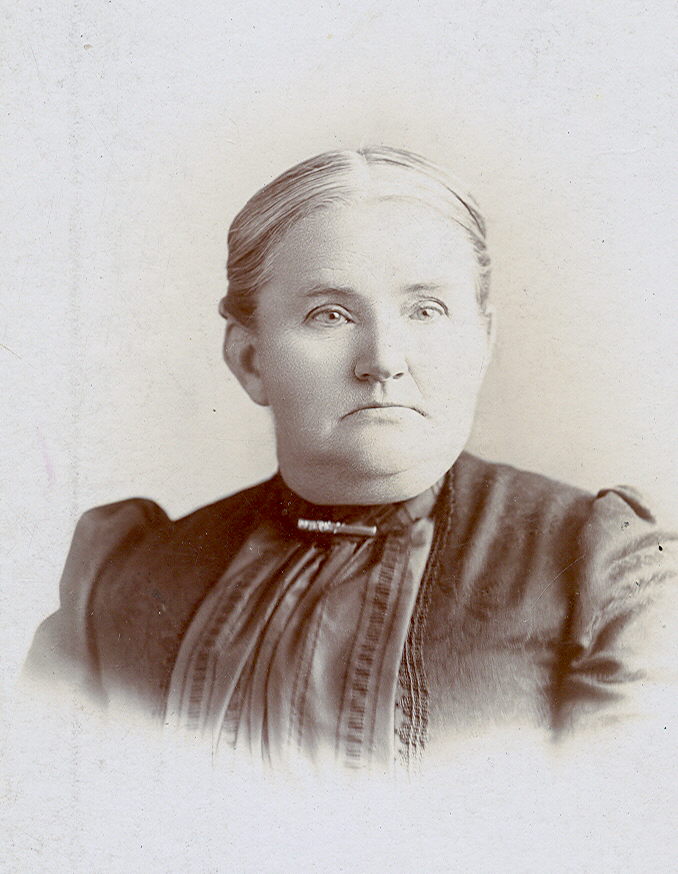Davinia Smith Forbes was born at St. Munnens, Fifschire, Scotland on February 11, 1850, She came to Utah with her parents when she was about three years of age in 1853. The trip across the plains proved too much for Davinia's mother. Apparently they had to walk much of the way, and though Janett survived the privations and hardships of the plains, they left her so weak that she died soon after their arrival in Salt Lake City. This left the care and upbringing of Davinia to her father and some kind neighbors. When Davinia was about seven years of age her father married again and took Davinia to live with him.
Davinia well remembered the move of the saints south at the time of Johnson's Army coming to Utah. She often spoke of the many hardships endured in those days. When the hoards of crickets descended upon the fertile fields and devoured the crops she helped to drive them into trenches the men had dug. She related to her children the coming of the seagulls.
Her first home was a dugout at Fort Lane near Craig's on the creek with a Mrs. Lindsey. Davinia had no shoes. When she wanted to go out in the snow, Davinia put burlap sacks on her feet. Her father promised to buy her some shoes. Davinia watched for him for days to get them. When he came he brought her some shoes made out of skins which pleased Davinia very much. Then she lived with a Mrs. King over in what is know as Obrien Hollow.
One day Mrs. King went to Salt Lake and left her young daughter and Davinia home to do some of the chores. They had to churn the butter and they left it unfinished. The pigs came into the house and spilled the cream so they did not know what to do. The girls put water in the churn to replace the cream. Every time Mr. King came into the house one or the other would churn the cream. Mr. King said, "My it takes a long time for that butter to come."
After she went to live with her father and his second wife, Davinia wanted some hoops for a dress. So Davinia cleaned some grain with a stick and tramped it until she had two bushels. It was so clean and nice that her father bought it for seed grain and he gave her $5 to purchase the hoops.
On June 26, 1865, Davinia was married to George W. Green at the home of her father and about two or three years later they were sealed in the endowment House in Salt Lake City for time and eternity. At the time of her death in 1925, there were besides her nine living children, forty-seven grandchildren and six great-grandchildren.
Her life was one of devotion to her family, her husband, her home, and her friends. She endured the hardships and privations of pioneer life bravely and got her greatest pleasure and happiness out of her work and service she was able to render to others. When sickness came into the homes of her brothers and sisters and other families in the community she was usually the first person they sent for to assist them.
She had little opportunity to attend the public schools of her time. As a result she never learned to write and could only read a little. Because of her cheerful disposition, her willingness to sacrifice her own feelings and self for others, and her devotion to her family, home and neighbors, the Lord educated her through His spirit and gave her an understanding of many things that people with schooling did not have. Often her children would read to her. Sometimes when her children would stumble on a word, she would tell them the word and its meaning without even looking at the book. Other times she would ask them to read the sentence or the paragraph over again and when they would come to the difficult word, she would give them the pronunciation and meaning. Her kids couldn't understand how she could do this without looking at the book. They believed the Lord blessed her with understanding that she might be able to assist her children in the things of which she herself had been deprived due to circumstances over which she had not control.
Davinia's whole life was one of giving, of doing right as she had the light to see the right, of sacrificing for others and of loving. She was a woman of high ideals, strong character, firm and steadfast nature, governed by the spirit of love. She was patient and kind yet firm and determined. She was a great influence on all of her children and kept their confidences and respect. When it was necessary to chastise or correct she did so, but with a spirit of love, sincerely trying to do what was for the best good and benefit of her children. She was sensitive as only a mother can be. An injury to the body or feelings of one of her children was an injury or sting to her heart. She had sympathy for her children in their trials and tried to encourage them. She rejoiced with them in their pleasures and successes and worried with them in time of trouble and misfortune.
Davinia, as she was known and called by her friends, was jovial, pleasant, happy, and contented. She seemed always prepared to meet the trials and problems of life. A faithful wife, a devoted and loving mother, a true and trusted friend and a loyal citizen, she had the respect, confidence, trust and love of all who knew her. She believed in being a good neighbor, was agreeable and congenial and found more pleasure in giving than in receiving.
In many ways she was fortunate and blessed. She lived in peace, happiness and contentment, never suffering many of the diseases and pains so common this earth, with the exception of child-bearing. As she lived so she died, in peace and contentment and without pain except for a few weeks sickness prior to her death at the age of 75. She died at Layton on May 4, 1925.
Here is an interesting section from the history of Davinia's mother Janet Smith (provided by another descendant):
"The next year John and Janet were expecting their first child. This was an event both of them were thrilled about. Janet had had a brother named David who died. This had been a great sorrow for the family. When Janet knew she would become a mother she said, 'If the child is a boy he shall be called David.' When the child was born 11 February 1850 it was a little girl; she was named after her uncle David and given the name of Davinia."
Davinia Smith Forbes was born at St. Munnens, Fifschire, Scotland on February 11, 1850, She came to Utah with her parents when she was about three years of age in 1853. The trip across the plains proved too much for Davinia's mother. Apparently they had to walk much of the way, and though Janett survived the privations and hardships of the plains, they left her so weak that she died soon after their arrival in Salt Lake City. This left the care and upbringing of Davinia to her father and some kind neighbors. When Davinia was about seven years of age her father married again and took Davinia to live with him.
Davinia well remembered the move of the saints south at the time of Johnson's Army coming to Utah. She often spoke of the many hardships endured in those days. When the hoards of crickets descended upon the fertile fields and devoured the crops she helped to drive them into trenches the men had dug. She related to her children the coming of the seagulls.
Her first home was a dugout at Fort Lane near Craig's on the creek with a Mrs. Lindsey. Davinia had no shoes. When she wanted to go out in the snow, Davinia put burlap sacks on her feet. Her father promised to buy her some shoes. Davinia watched for him for days to get them. When he came he brought her some shoes made out of skins which pleased Davinia very much. Then she lived with a Mrs. King over in what is know as Obrien Hollow.
One day Mrs. King went to Salt Lake and left her young daughter and Davinia home to do some of the chores. They had to churn the butter and they left it unfinished. The pigs came into the house and spilled the cream so they did not know what to do. The girls put water in the churn to replace the cream. Every time Mr. King came into the house one or the other would churn the cream. Mr. King said, "My it takes a long time for that butter to come."
After she went to live with her father and his second wife, Davinia wanted some hoops for a dress. So Davinia cleaned some grain with a stick and tramped it until she had two bushels. It was so clean and nice that her father bought it for seed grain and he gave her $5 to purchase the hoops.
On June 26, 1865, Davinia was married to George W. Green at the home of her father and about two or three years later they were sealed in the endowment House in Salt Lake City for time and eternity. At the time of her death in 1925, there were besides her nine living children, forty-seven grandchildren and six great-grandchildren.
Her life was one of devotion to her family, her husband, her home, and her friends. She endured the hardships and privations of pioneer life bravely and got her greatest pleasure and happiness out of her work and service she was able to render to others. When sickness came into the homes of her brothers and sisters and other families in the community she was usually the first person they sent for to assist them.
She had little opportunity to attend the public schools of her time. As a result she never learned to write and could only read a little. Because of her cheerful disposition, her willingness to sacrifice her own feelings and self for others, and her devotion to her family, home and neighbors, the Lord educated her through His spirit and gave her an understanding of many things that people with schooling did not have. Often her children would read to her. Sometimes when her children would stumble on a word, she would tell them the word and its meaning without even looking at the book. Other times she would ask them to read the sentence or the paragraph over again and when they would come to the difficult word, she would give them the pronunciation and meaning. Her kids couldn't understand how she could do this without looking at the book. They believed the Lord blessed her with understanding that she might be able to assist her children in the things of which she herself had been deprived due to circumstances over which she had not control.
Davinia's whole life was one of giving, of doing right as she had the light to see the right, of sacrificing for others and of loving. She was a woman of high ideals, strong character, firm and steadfast nature, governed by the spirit of love. She was patient and kind yet firm and determined. She was a great influence on all of her children and kept their confidences and respect. When it was necessary to chastise or correct she did so, but with a spirit of love, sincerely trying to do what was for the best good and benefit of her children. She was sensitive as only a mother can be. An injury to the body or feelings of one of her children was an injury or sting to her heart. She had sympathy for her children in their trials and tried to encourage them. She rejoiced with them in their pleasures and successes and worried with them in time of trouble and misfortune.
Davinia, as she was known and called by her friends, was jovial, pleasant, happy, and contented. She seemed always prepared to meet the trials and problems of life. A faithful wife, a devoted and loving mother, a true and trusted friend and a loyal citizen, she had the respect, confidence, trust and love of all who knew her. She believed in being a good neighbor, was agreeable and congenial and found more pleasure in giving than in receiving.
In many ways she was fortunate and blessed. She lived in peace, happiness and contentment, never suffering many of the diseases and pains so common this earth, with the exception of child-bearing. As she lived so she died, in peace and contentment and without pain except for a few weeks sickness prior to her death at the age of 75. She died at Layton on May 4, 1925.
Here is an interesting section from the history of Davinia's mother Janet Smith (provided by another descendant):
"The next year John and Janet were expecting their first child. This was an event both of them were thrilled about. Janet had had a brother named David who died. This had been a great sorrow for the family. When Janet knew she would become a mother she said, 'If the child is a boy he shall be called David.' When the child was born 11 February 1850 it was a little girl; she was named after her uncle David and given the name of Davinia."
Family Members
Sponsored by Ancestry
Advertisement
Advertisement























